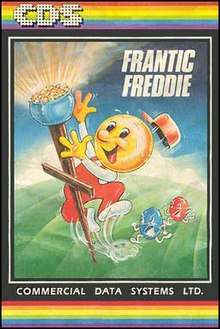Frantic Freddie
| Frantic Freddie | |
|---|---|
 Box art | |
| Publisher(s) | Commercial Data Systems |
| Designer(s) | Kris Hatlelid, Gregor Larson |
| Platform(s) | Commodore 64 |
| Release | 1983 |
| Genre(s) | Platform game |
| Mode(s) | Single player |
Frantic Freddie is a 1983 platform game for the Commodore 64 written by Kris Hatlelid and Gregor Larson and published by Commercial Data Systems.
Gameplay
The player uses a joystick to control the eponymous Frantic Freddie, a telephone line engineer. Each level takes place on a single screen, each with five full-width platforms connected by telegraph poles. Freddie runs along the platforms; he cannot pass through the telegraph poles but may climb up and down either side of them. The goal of the game is to collect the pots of gold resting on the platforms, as well as optional bonus items which scroll through the playing area. Each level is patrolled by three to five monstrous "Greeblies" that Freddie must avoid, lest he lose a life.
The game has a total of sixteen playable levels punctuated by animated intermission sequences.
Soundtrack
The game was particularly noted for its synthesized soundtrack, which mingled arrangements of popular and ragtime songs:[1]
- "Crazy Little Thing Called Love" (Queen)
- "Boogie Fever" (The Sylvers)
- "The Easy Winners" (Scott Joplin)
- "Don't Bring Me Down" (Electric Light Orchestra)
- "Kodachrome" (Paul Simon)
- "A Fifth of Beethoven" (Walter Murphy)
- "Pine Apple Rag" (Scott Joplin)
- "Elite Syncopations" (Scott Joplin)
- "Maple Leaf Rag" (Scott Joplin)
- "The Sycamore" (Scott Joplin)
Reception
Reviewing a budget release of the game in 1988, Pete Connor of ACE described Frantic Freddie as "a pretty tired game" that promised only "a modicum of fun".[2]
References
- ↑ Collins, Karen (2008). Game Sound: An Introduction to the History, Theory, and Practice of Video Game Music and Sound Design. Cambridge, MA: The MIT Press. p. 32–33. ISBN 978-0-262-03378-7.
- ↑ Connor, Pete (1988). "Frantic Freddie". ACE. Future plc (5): 66.